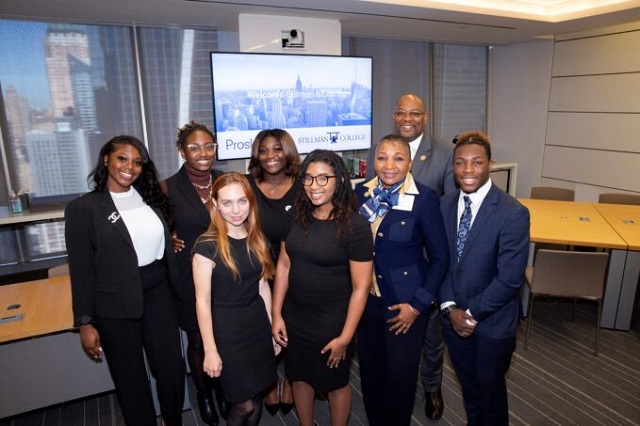Our story begins in or about 1875 when both Proskauer and Stillman College were founded. Fast forward almost 150 years when, this past summer, Stillman Professor Gordon Govens reached out to Proskauer. There have been graduates of Stillman, a small historically black college in Alabama, who have gone on to become lawyers but not until now had the school developed a formal prelaw program. Dr. Govens was formerly a practicing lawyer before his academic career and indeed, was an associate at Proskauer in the early 1990s. He thought that there might be a way for the two institutions to work together, and he was right.
Earlier this month, Proskauer hosted seven prelaw students along with Dr. Govens and Stillman's Director of Alumni Affairs for a two-day series of events and meetings in New York City. We arranged for career panels where lawyers and business services professionals at Proskauer from various specialties and departments, such as sports law and intellectual property, discussed their work and career paths. We also conducted resume writing, interview preparation and professionalism workshops as well as providing guidance for the law school admissions process. As part of that exercise, we were privileged to have in attendance the Associate Director of Admissions at Fordham Law School. The students also heard about Proskauer's pro bono work and volunteering efforts, including a panel discussion in connection with Veteran's Day.
Outside of the firm, we met with a number of professionals at the federal courthouse in Manhattan, including individuals from the U.S. Attorney's Office, Federal Defenders, U.S. Probation, and U.S. Marshals Service. The visit concluded with United States District Court Judge Victor Marrero, who shared insights from his distinguished career in public service.
According to Dr. Govens, "The two day prelaw seminar created a paradigm shift for our students. It developed their perspectives on college, law school, success in the legal profession, and excellence. Stillman students were not only motivated to pursue legal careers, but more important, inspired by Proskauer attorneys and staff to use the skills they develop to serve others."
Stillman College History
Stillman is a private, historically black liberal arts college in Tuscaloosa, Alabama. In 1875, just before the end of Reconstruction, the General Assembly of the Presbyterian Church (USA) authorized its creation, and held its first classes of six students in the fall of 1876. Its founder, Dr. Charles Allen Stillman, pastor of the First Presbyterian Church of Tuscaloosa, intended the school to train African American men as ministers. Women were admitted in 1899 soon after the school had purchased the former Cochrane plantation house and 20 acres of land on the west side of Tuscaloosa, which remains the site of the present campus. The Cochrane home was first used as a student residence, and today the six marble columns from the home, demolished in 1954, grace the façade of Stillman College's Sheppard Library.
Stillman College has been committed to social justice and community activism since its inception. In 1962, Stillman students led the movement to desegregate Tuscaloosa's bus company after their arrests for refusing to give up their seats. Vivian Malone was the first graduate from the University of Alabama, whom Governor George Wallace attempted to block at the classroom steps from enrolling at the then all-white university. Ms. Malone lived on Stillman's campus while enrolled at the University of Alabama. The school has a rich history of prominent graduates, faculty and staff and extended family that includes celebrities, politicians, business people, civil rights leaders, athletes and more. Building on its founding vision, Stillman College continues to provide an educational environment where it equips its students to build a just and sustainable world.

